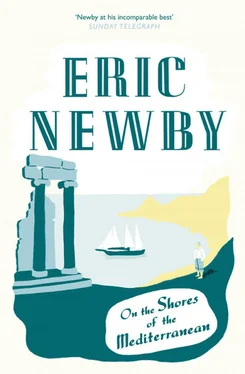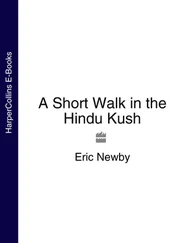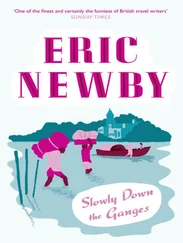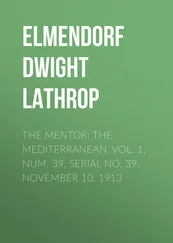There was also an astonishing profusion of what can only be described as Victorian potted plants, aspidistras, castor oil plants and such, all standing on rather wobbly whatnots. It was all terribly melancholy and over everything hung a faint but palpable, slightly acid smell, compounded of Slavonic cooking, cigarettes, drainage and other elements, difficult to identify, let alone describe, but once inhaled never forgotten. It was a room that was the prototype of a room in a village inn anywhere between the one in which we were now sitting near the eastern shores of the Adriatic, and the Volga.
Here in the Kras, in spite of the heat and the vines heavy with black grapes, not more than twenty miles from its shores, one felt the Mediterranean world receding, could sense that people were no longer looking to it either for sustenance or inspiration, but to Middle Europe.
Having seated us at the table Marija hurried away and after a bit returned carrying a tray on which there was a litre bottle of red wine, a plate of the local ham called pršut , so thinly sliced that it was almost transparent, and a kind of flat, crusty bread called pogača , which she proceeded to cut up, meanwhile making pantomime gestures of eating and drinking to me, reinforcing them with little cries in Italian, which she had somehow got it into her head I was unfamiliar with, of ‘Bere! Mangiare!’ , using an infinitive form commonly reserved for cretins, monoglot soldiers of invading armies and infants still at the breast. The pogača was hot from the wood oven, which was outside in the back yard. The pršut was delicious, a rare delicacy. The smoking of this sort of ham is usually carried out in late autumn or in winter and the process of preparing it is only commenced at the time of the full moon. At any other time an inferior product will result. Like many other peasant communities around the Mediterranean, and also elsewhere, the inhabitants of the Kras are still to a great extent governed by the moon in their everyday life. No one used to be surprised, for instance, when one of the apparently robust wooden bedsteads, bought by a newly married couple, disintegrated if it was purchased at the time of the new moon. No other fate could be expected for it. But that was in the past. Now, in the 1980s, bedsteads disintegrated whatever phase the moon was in.
To prepare this ham it was first kept in salt for a week, then it was put in what looked a bit like an old-fashioned letter press for another week, the pressure being increased daily. It was then hung in a chimney to smoke over a fire of ash wood and after that it was hung for anything from seven months to a year in a dry place, having been previously sprinkled with pepper as a protection against flies which, together with dampness, were its principal enemies. By the time a pršut reached Trieste, a good one was about as expensive as smoked salmon.
The wine was Teran, the product of a close circle of about a dozen villages north of the main road from Trieste to Ljubljana, between the Nanos range and the present frontier with Italy. It is a deep purple colour, almost black, with a taste that some people, when they first try it, compare to that of rusty old nuts and bolts. It is best either with hot food, or else with the pršut and the pogača . It is not a wine to drink by itself. It improves on acquaintanceship.
Meanwhile, we ate and drank, while Marija constantly refilled the glasses, particularly my glass, which somehow became empty quicker than Wanda’s, all the time going on and on to Wanda in Slovene about births and deaths and marriages and who had emigrated where, only pausing to go out and get another bottle.
‘Marija says we must drink,’ Wanda said, I thought illogically. Usually she spends her time telling me not to.
‘I am drinking. It’s you who’s not drinking. Anyway, why doesn’t she drink?’
‘Here, it is not the custom for widows …’
‘It’s not the custom for anyone to drink like this, even where I come from. You’d think she wanted to keep me here in pickle.’
‘Bere! Bere!’ (‘Drink! Drink!’) said Marija, who was already refilling my glass. From the yard outside came the sounds of what later proved to be a free-range chicken being slaughtered.
‘That’s our dinner,’ Wanda said. ‘Now they’re going to pluck it, draw it, truss it, put it in a pot on top of the stove with butter and rosemary. It’s going to be hours before we eat dinner.’
‘How many hours?’
‘Three hours.’
‘It’s only seven o’clock now. It’ll be ten. By then I’ll be dead at this rate. Why didn’t you tell her we’d be happy with something simpler? An omelette or just more pršut , more pogača.’
‘I did but she wouldn’t listen. Now she wants to give you some žganje to keep you going.’
‘Why don’t you stop her? What’s come over you?’
‘She will be very upset if you don’t drink. She will say that you do not like her drinks. Tonight you must drink. It is the custom.’
‘Bere! Bere!’ cried Marija, this by-now-to-me-terrible woman, bringing a clean glass and more than half filling it with žganje , then waving her arms as if she was performing a conjuring trick or conducting some vast alcoholic orchestra. What Wanda said was true. The more I drank the more she seemed to warm to me.
Žganje is the equivalent of Italian grappa or French marc , spirit distilled from the skins, pips and stalks left over after the grapes have been pressed and the wine made, but here, in the sticks, home-made and much stronger than what is normally sold commercially because it has been distilled more often. On top of what I had already drunk it was murderous.
‘Look,’ I said, ‘I’ve either got to go to bed until it’s time for dinner, or go for a walk or something. I just can’t go on like this.’
‘You can’t, we’re going to sit with the deads.’
‘You mean a wake? What they had for your mother?’
‘I don’t know what you call it in English. In Italian it’s veglia . You sit with the deads.’
‘I know you sit with the deads,’ I said. ‘We did it with your mother.’
‘Yes, that’s right, wake for the deads. A very old lady, ninety-three, called Nunča Pahorča, Marija’s aunt, died this morning. She was very nice. She’s being buried tomorrow.’
‘Listen,’ I said. ‘I’m half tight. If you think I’m going to sit by some dead dear old lady for three hours until dinner’s ready you’ve got it all wrong. Besides, we had enough of this funeral thing in Naples.’
‘It’s better than sitting here getting dronker,’ she said. ‘And I was only joking about the chicken. It was being killed for someone else. Ours is nearly ready. And you know it doesn’t matter about being a bit dronk, others will be dronk also. We shall only stay a few minutes.’
‘OK,’ I said. ‘Let’s go, before she brings any more žganje . Otherwise it’ll be a double funeral and I don’t fancy sharing a vault with a nice old lady of ninety-three.’
The house in which the remains of Nunča Pahorča were on exhibition was very small, for she had been a widow for twenty years and had moved to it when her husband died when she herself was well over seventy. Nunča means ‘aunt’ in the dialect spoken nearer the Adriatic, where she had once lived, but where she now lived she would have been known as Teta Pahorča.
The heavy old bed in which she had died only a few hours before had been taken to pieces and removed temporarily to a shed in her vegetable garden, where it now stood together with a bedside table on which there were a number of bottles containing various liniments that were sovereign remedies against aches and pains, the sort that have labels with gloomy likenesses of their moustached and bearded inventors and their scrawly, illegible signatures printed on them. Now, washed and changed by a couple of the women of the village who knew how to do these things, she lay dressed from head to foot in her best black, from the black lace mantilla which covered the snow-white hair of which she had been so proud to her black felt boots, on her best linen sheets which were part of her marriage trousseau and which she had kept for more than seventy years for this purpose, in a plastic coffin with simulated metal handles, lined with pink ruched nylon, her now waxen features decently composed but no longer with any human attributes, her hands crossed and holding a candle and a rosary that had been placed in them. The walls of the room had been hung with black cloth by the undertaker’s men; a tall candle burned at each of the four corners of the coffin, and at the foot of it, on a table, there were sprigs of box and a receptacle containing holy water.
Читать дальше












